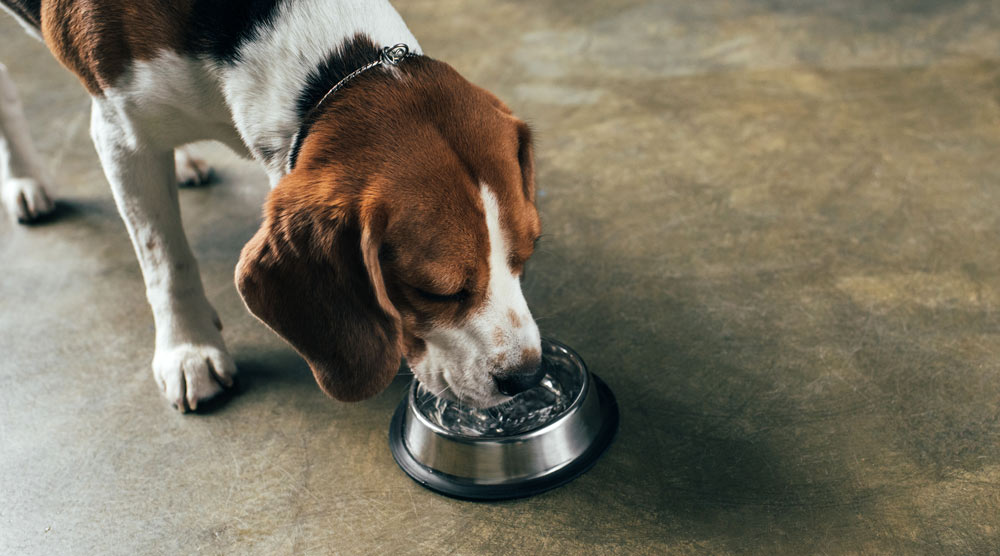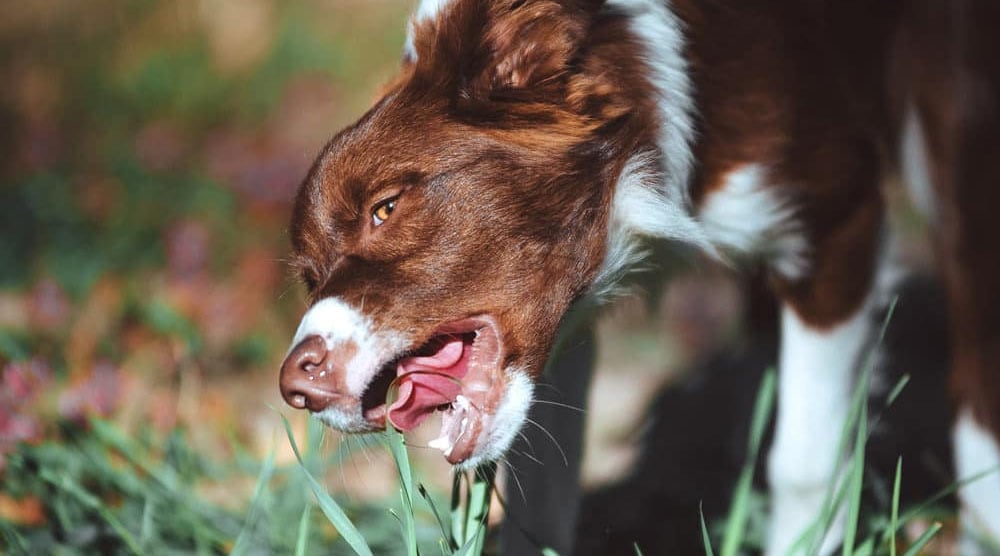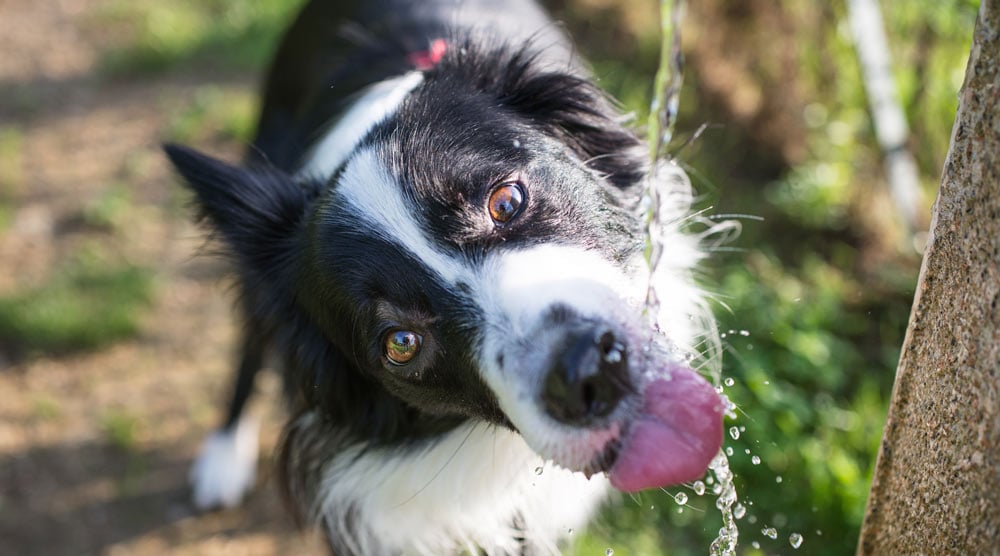It can seem strange when a dog rolls around after eating. Most humans are ready for a relaxing nap after a meal, rather than a burst of physical activity!
There are logical reasons why a dog might roll around after food though. In many cases, the dog is trying to clean bits of food from around their mouth. Rolling may also be an instinctive way to hide the scent of food or to dislodge food stuck between the teeth.
This behaviour isn’t always harmless though. Rolling after food can sometimes indicate a medical problem, such as sore gums or an allergy. Let’s learn more about why dogs roll after eating and when you should be concerned.
Contents
Why Do Dogs Roll Around After Eating
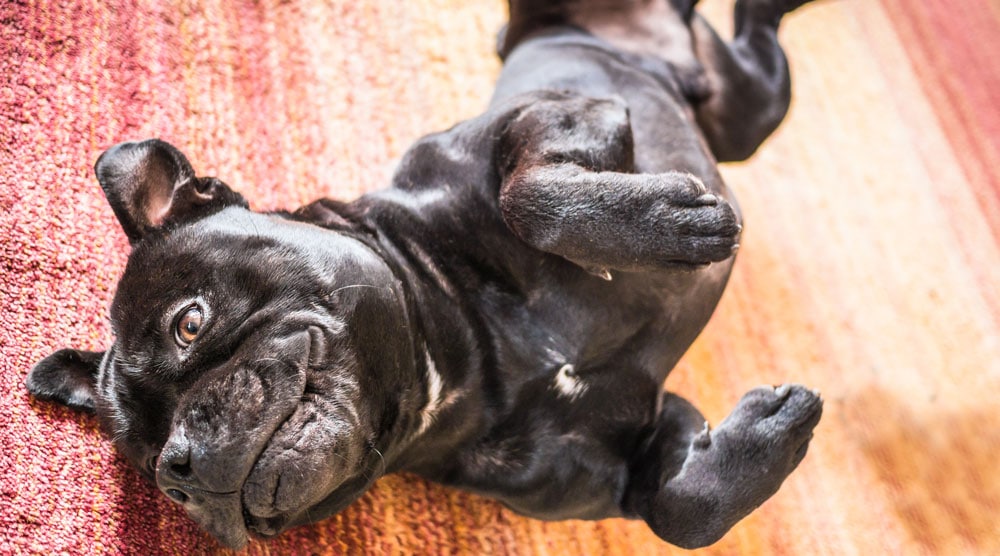
It’s hard to know exactly why dogs roll around after eating. There are many plausible theories, but these aren’t always proven and won’t apply to every situation.
With that said, here’s an overview of the most likely reasons for rolling after a meal.
Cleaning (Or Drying) Their Face
Dogs don’t like the hair around their mouth to be wet or dirty with bits of food, so it’s natural to clean themselves after a meal.
Cleanliness may be more of an issue for dogs with long coats, as their hair falls into the bowl more often. You’ll also see these dogs rub their face after drinking, as the hair around the mouth becomes uncomfortably wet.
Food Stuck Between Teeth
We all know how frustrating it is when food is stuck between our teeth! This can be even more annoying for dogs, as they don’t have an easy way to remove it.
Some dogs might try to dislodge stuck food by rubbing their face along the floor or rolling around. This is more common in dogs with misaligned teeth, but any dog can get food stuck between their teeth.
Note: Misaligned teeth can lead to other health problems. If your dog’s teeth are misaligned, it’s important to watch for signs of a dental problem, like bad breath or mouth pawing.
Masking The Scent Of Food
In the wild, the scent of food could attract predators, as many animals have an excellent sense of smell.
To reduce this risk, it’s thought that dogs may instinctively rub their face on the floor. This could mask the scent of leftover food and make the dog less likely to be located by other animals.
Note: Domestic dogs are very different from wolves and wild dogs. However, some wild instincts still remain.
Teeth Or Gum Pain
If a dog has a tooth or gum problem, eating may cause them extra discomfort. They might try to put pressure on the affected area by rolling around, as this can provide temporary relief.
In this situation, there will be other symptoms of the dog being in discomfort. These can include:
- Red or inflamed gums
- Bad breath
- Slower eating
- Pawing at the face
- Whining during eating
- A reluctance to be touched on the head.
You should contact a vet immediately if you think your dog might be in pain. Teeth and gum issues can be painful and harm your dog’s quality of life.
It’s Fun!
Rolling around might simply be a fun thing for your dog to do after the excitement of a meal.
In this case, you’ll often see the dog put their head against the floor, leave their rear end up (like a play bow), and walk forward. They’ll also often roll over and scratch their back against the floor.
What Are Some Other Reasons For A Dog Rolling Around?
Dogs don’t just roll around after eating. It can be triggered by various things, ranging from an itchy back to serious medical issues.
For example, dogs often roll around to dry themselves after a walk or bath. This is sometimes accompanied by frantically digging or rubbing against a sofa.
Dogs may also try to remove collars or harnesses by rubbing their face along the floor – especially if they aren’t accustomed to wearing them (or the collar is uncomfortably tight). To avoid this problem, you should always introduce a collar or harness to your dog slowly and with positive reinforcement.
Additionally, dog breeds with skin folds on their face may roll around to itch or clean between the wrinkles. You can help relieve discomfort by using a soft cloth to wipe around their mouth – especially after a meal.
While rolling around isn’t always a sign of a medical problem, this behaviour can be a symptom that the dog is unwell or in pain. Medical issues that cause itchiness can also lead to rolling around, as this is one of the most effective ways for a dog to scratch a large body area.
Some potential conditions that might lead to rolling around include:
- Ear infections. Rolling around and putting pressure on the ear may relieve discomfort. Look for other signs, such as ear swelling, redness, and discharge.
- Ear mites. Ear mites are a parasite that cause intense itchiness in the ear. Dogs with ear mites often roll around to try and get a satisfying scratch.
- Dental disease. We mentioned this earlier, but dental issues may cause a dog to rub their mouth while rolling around. This provides short-term relief, in the same way that pushing your tongue against a sore gum can sometimes help with the pain.
- Low calcium. Calcium deficiency can cause skin dryness and itching, leading to the dog rolling around to try and get relief. It can also cause a loss of appetite, twitching, and tiredness.
- Allergic reactions. Allergies can cause itchiness, forcing the dog to roll around to scratch the affected area. Other symptoms include paw chewing, pawing, itchy eyes, redness, and gastrointestinal problems. There are many possible causes of allergies, including environmental (such as dust mites or pollen) and food. Always contact a vet if you notice symptoms of an allergy.
- Puppy teething. Teething can be very uncomfortable for a puppy. They may try to gain relief from the pain by putting pressure on the gums. Chewing has a similar effect, which is why puppies can be destructive!
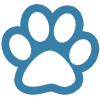
What About Rubbing Against Sofas?
Along with floor rolling, it’s common to see dogs rub their face against the sofa. The reasons for this are similar to rolling, with many dogs using a sofa to clean or dry their face.
You’ll often see dogs alternate between rubbing against a sofa and rolling around after eating. However, older or bigger dogs may prefer the sofa, as they might not be agile enough to rub their face on the floor.
When Should You Contact A Vet?
If your dog rolls around for a short time after eating, and there are no other symptoms, then there is often nothing to worry about. Your dog is probably cleaning or drying the hair around their mouth.
However, if rolling is accompanied by other symptoms of illness or pain, then you should always contact a vet. These include:
- Symptoms of gum or tooth issues, such as bleeding, bad breath, head pawing, whining, slower eating and a loss of appetite.
- Symptoms of allergies, such as itchiness, chewing, red or inflamed eyes, diarrhea, and vomiting.
- Symptoms of an ear infection, including red or inflamed ears, discharge, pawing at the ears, and swelling.
You should also contact a vet if the rolling seems excessive, frantic, or doesn’t seem to be linked to eating or getting wet. It’s also a good idea to get a vet checkup if your dog starts rolling after eating more often than normal.
Summary
It’s common to see dogs rolling around after a meal. This is often nothing more serious than the dog trying to clean food from their mouth. Many dogs also seem to find rolling fun, especially after the excitement of a tasty meal!
However, there are also medical issues that can cause this behaviour. Ear infections, allergies, tooth pain, and even low calcium can all make rolling more likely. For this reason, you should contact a vet if your dog is rolling around more frequently, seems to be in discomfort, or has other symptoms of illness.
Do you have any questions about why dogs roll around after eating? Please use the comments form below to get in touch.

